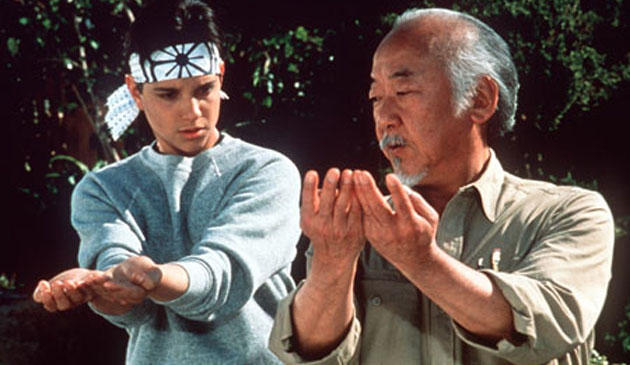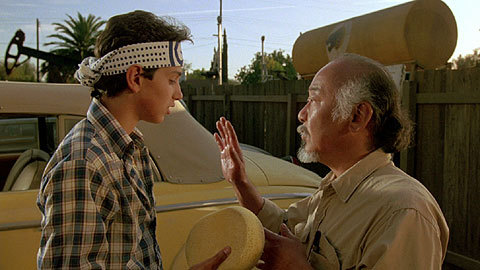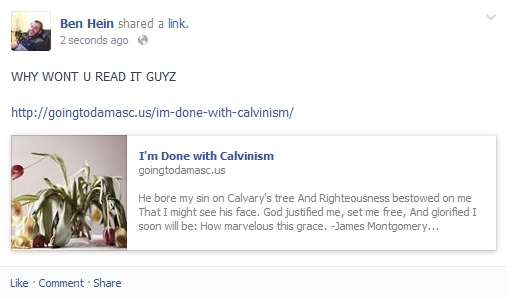Out of the great 1980’s movie era came what is widely regarded as one of the most iconic films in movie history, The Karate Kid. In this film, the protagonist Daniel-San is perpetually bullied and beat up by the Karate students of the Cobra Kai dojo until the wise sage and Karate master Mr. Miyagi steps in and saves him. Eventually, Mr. Miyagi reluctantly agrees to teach Daniel-San Karate in order to beat the Cobra Kai bullies in a local Karate tournament.
Unbeknownst to Daniel-San, Mr. Miyagi begins teaching him Karate through regular household chores; waxing Miyagi’s car, painting his house and fence, and sanding his wooden deck. Of course without the end result in mind, to Daniel-San this is nothing more than being an errand boy in a feeble attempt to earn Mr. Miyagi’s time so he’ll teach him real Karate. This only lasts for four days, until finally Daniel-San has had enough with the chores and furiously decides its time to go home.
“Daniel-San!” exclaims Mr. Miyagi. “Come here!”
As a martial artist myself, I love what follows in this scene between these two characters. Mr. Miyagi begins to unfold what his plan has been all along. “Sand the floor” is not simply a technique Daniel-San learns to make a deck look nice, but to block kicks coming at his midsection. “Paint the fence” is not only the proper technique for exterior remodeling, but for blocking high and low punches as well. “Wax on, wax off” is another way of saying, “Use correct technique or you’re going to get punched in the face.”
Daniel-San finally gets it; he’d been learning Karate all along.
Sometimes I feel like my attempts at learning theology are much like Daniel-San’s approach to learning karate. I don’t want to know application and wisdom, I just want to know facts and answers. My pride gets in the way and turns theology into an intellectual pursuit rather than worship. It is all too easy for me to turn my studies of the Scriptures into an attempt to tear down other peoples philosophies and worldviews, completely neglecting the fact that I’m supposed to be drawing closer to the holy and loving God of the entire universe. In haste, I determine that people who aren’t teaching me enough facts aren’t teaching me enough “theology.” After all, in order to be the best around you have to know more than everyone else, right?
Take for example when I started my Islam class a couple years ago. I went into the class wanting a five-point systematic discourse on how to tear apart Muslim apologists. Instead, I learned that if I don’t actually love people, I have no business engaging in evangelistic dialogue – regardless of how much I know.
Wax on, wax off. Paint the fence, Ben-San.
When I first became a Christian and the majesties of God were opened to me, I bought every apologetic resource I could find hoping to prove to my friends why I was right and they were wrong. I had no conception that a right understanding of God should only lead me to a correct worship of God.
Wax on, wax off. Paint the fence, Ben-San.
I think about how often I go into a sermon on Sunday simply looking for new nuggets of information and knowledge, rather than a desire to draw near to the throne of grace through the preaching of God’s Word. Instead of setting myself at the foot of the cross, seeking to have the Word of God pierce my heart, I elevate myself to a place where I feel worthy of picking apart good or bad facts.
Wax on, wax off. Paint the fence, Ben-San.
After every one of these examples, I had a moment where I realized that my original desires weren’t for real theology, but something entirely different. Every time my knowledge and pride puffs me up, like a crane kick to the face I get knocked down and realize I don’t know real theology at all.
The truth is, more often then not I act like one of the antagonist students from Cobra Kai than I do a protege of Mr. Miyagi. My goal is to show no mercy, sweeping the leg of my opponents and humiliating them at whatever cost. Oh Lord, shape my study of you to lead towards praise of you! It has been said that a right theology leads to proper doxology. May my life be evidenced not by how much I know, but by the magnitude of the God I worship. He must increase, but I must decrease.
Being the best around isn’t about how much you know, but instead is defined by being united to a compassionate and loving God through the sacrifice of Christ, as evidenced by your kindness and goodness towards other people. Being the best around means realizing that Christ is Lord over all, and that I am the least of these worthy to be called one of his own.
If you’re anything like me, then you love ordering things on Amazon Prime. Books, gifts (I do all of my birthday and Christmas shopping on Amazon) and basically everything else except for my groceries are purchased with Amazon. It’s such a time and money saver!
I’ve recently been thinking a lot about the term salvation (or, deliverance), and I started to realize that in many ways the “components” of salvation can be broken down the same way as an Amazon Prime order. When we order things online we naturally just think of that purchase as a one step process. I click, it shows up two days later. Similarly, today we often minimize salvation to a one-step deal, and end up equating salvation to simply being the same thing as being forgiven (justified) without realizing that in our salvation we get ALL of Christ, not just one small piece of him.
But if you think about it, an Amazon Prime order isn’t as simple as just clicking on an item and then having it show up at your door a few days later. There are a few steps along the way, which I will outline below:
1) The Transaction: At some point, you add an item to your cart and click ‘buy’. When this happens, a transaction takes place. You paid for the item in order to get it from Amazon. The item could never be yours without a transaction where you pay for it in full.
2) A Change in Ownership: Immediately following the transaction, the item becomes mine and it is guaranteed to me. Because of Amazon’s guarantee to the customer, there is no scenario where I will end up without the item. It is now mine.
3) The Delivery Process: Unfortunately, Amazon has yet to invent space-time warp particle displacers, so the item cannot be instantly transferred to me. It must first be placed on a truck and sent out by Amazon and come via a delivery service. Even if the delivery process hits a snag or a delay, the process will still ultimately end up with me getting the product I ordered, because of the price I paid, the change in ownership and the guarantee to me.
4) The Arrival: Two days after your order, the product you paid for in the transaction that became yours ends up in your hands!
See, an Amazon Prime delivery isn’t as simple as one step – even though sometimes it may seem that way. In a similar way, we should see our deliverance – our salvation – as something much bigger than just one step.
Indeed a transaction took place to purchase us; we are a blood-bought people. But we are not only blood-bought people, because when the divine transaction of Christ dying in our place occurred to forgive us of our sin, we became children of our Heavenly Father. Our ownership was transferred out of this world and we became adopted as sons and daughters, acquiring the inheritance of Christ.
But, having been ransomed to the Father, we are not instantly taken to him. No, there is now a “delivery process” where we are being made more like his Son. I recently ordered some comics from Amazon (don’t judge me!), but rather than delivering them to me the UPS driver just took them to the local UPS center for pickup instead. The delivery hit a snag – yes it was a delay, but it didn’t erase the reality that those comics still belong to me, and are guaranteed to me. This is our sanctification; we are being prepared for the day when we will be presented to the Groom as the beautiful, spotless Bride. There may be hiccups on the way, snags that seem to slow or even reverse the process, but we are promised to Him. Nothing can now separate us from our guaranteed delivery.
Finally, in our glorification we will arrive in the Fathers presence. Never to leave his presence, we look forward to the final state of being delivered into his hands.
This comparison, of course, is not at all to belittle the magnitude and beauty of our salvation. However, I think this is a helpful picture for realizing that there is more than one piece to our salvation – and that is a good thing. So, to summarize in the paraphrased words of Herman Bavinck; in salvation, Christ first restores our relationship to God, then we are adopted into God, then he renews us after God’s image, and finally preserves for us our heavenly inheritance.
Guaranteed.
Alexander Smellie, “The Hour of Silence” 1899
—–
“Then he said, “Jesus, remember me when you come into your kingdom.”
Jesus answered him, “I tell you the truth, today you will be with Me in paradise!”
Luke 23:42-43
“Twas a thief,” Robert Browning writes, “who said the last kind word to Christ.”
In the morning the thief was OUT of Christ:
far from God and far from righteousness,
the helpless captive of sin,
the child of despair and death.
At noon the thief was IN Christ:
remembered graciously by the Savior of the lost,
redeemed with an everlasting redemption,
endowed with the new heart,
and freely and perfectly justified.
In the evening the thief was WITH Christ:
gazing on the glories of paradise,
safe at home with his good Shepherd and adorable Redeemer.
What a crowded and memorable day this was in his history! So much was pressed into these few hours. Such a glorious and unprecedented transition they brought, from the cruel cross–to Heaven’s glory!
OUT of Christ,
then IN Christ,
then WITH Christ!
Nature,
then grace,
then glory!
Hopelessly lost in the far country,
then safe under the Savior’s wings,
then beside the Lord on His glorious throne!
Are these the three stages in my spiritual biography?
I know the first only too well.
Am I growing more and more familiar with the second?
Is it my joy to look forward to the third?
“I ask not the favor given to Paul,” Copernicus said, “I seek not the grace bestowed upon Peter–but I beg the mercy granted to the thief on the cross!”







